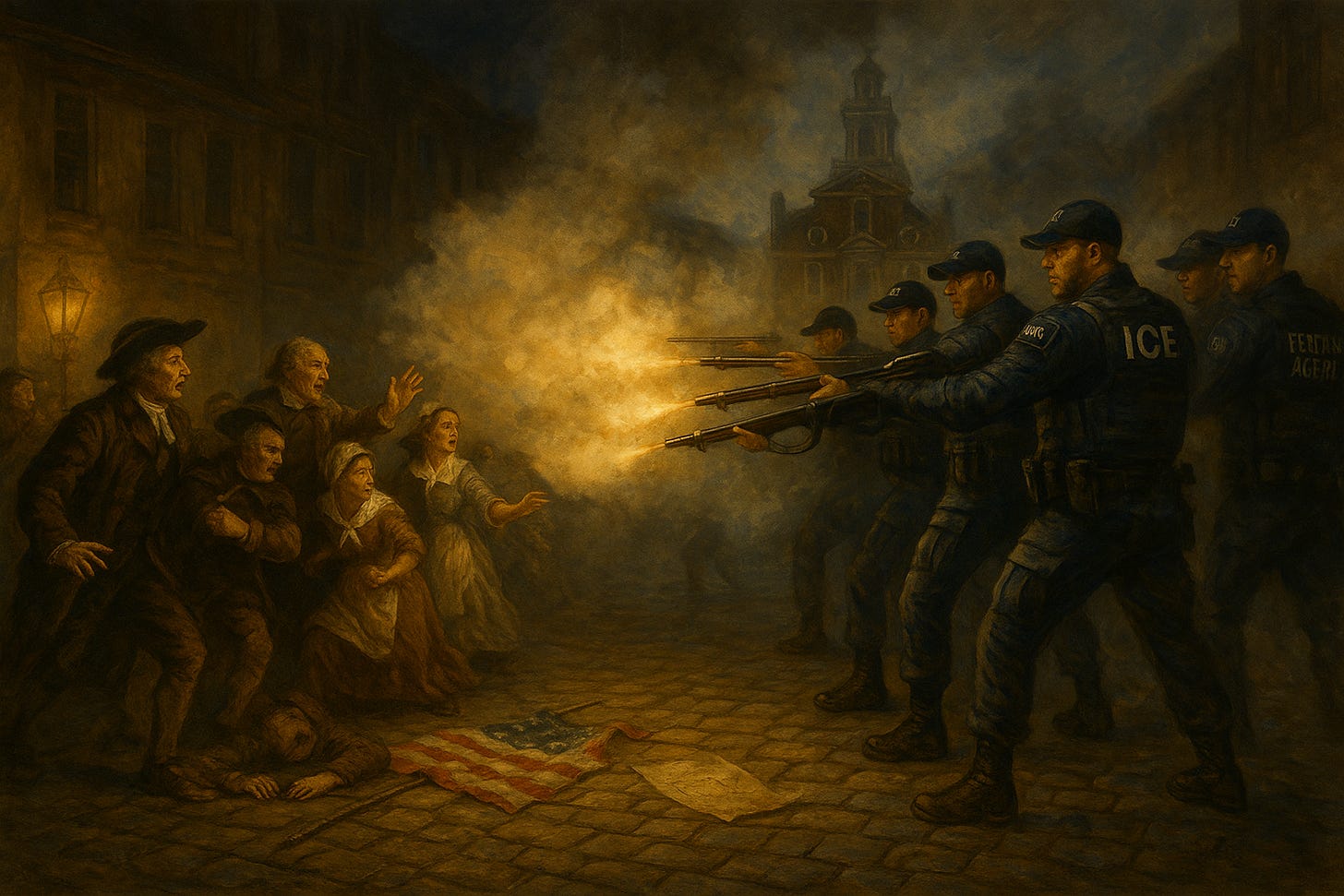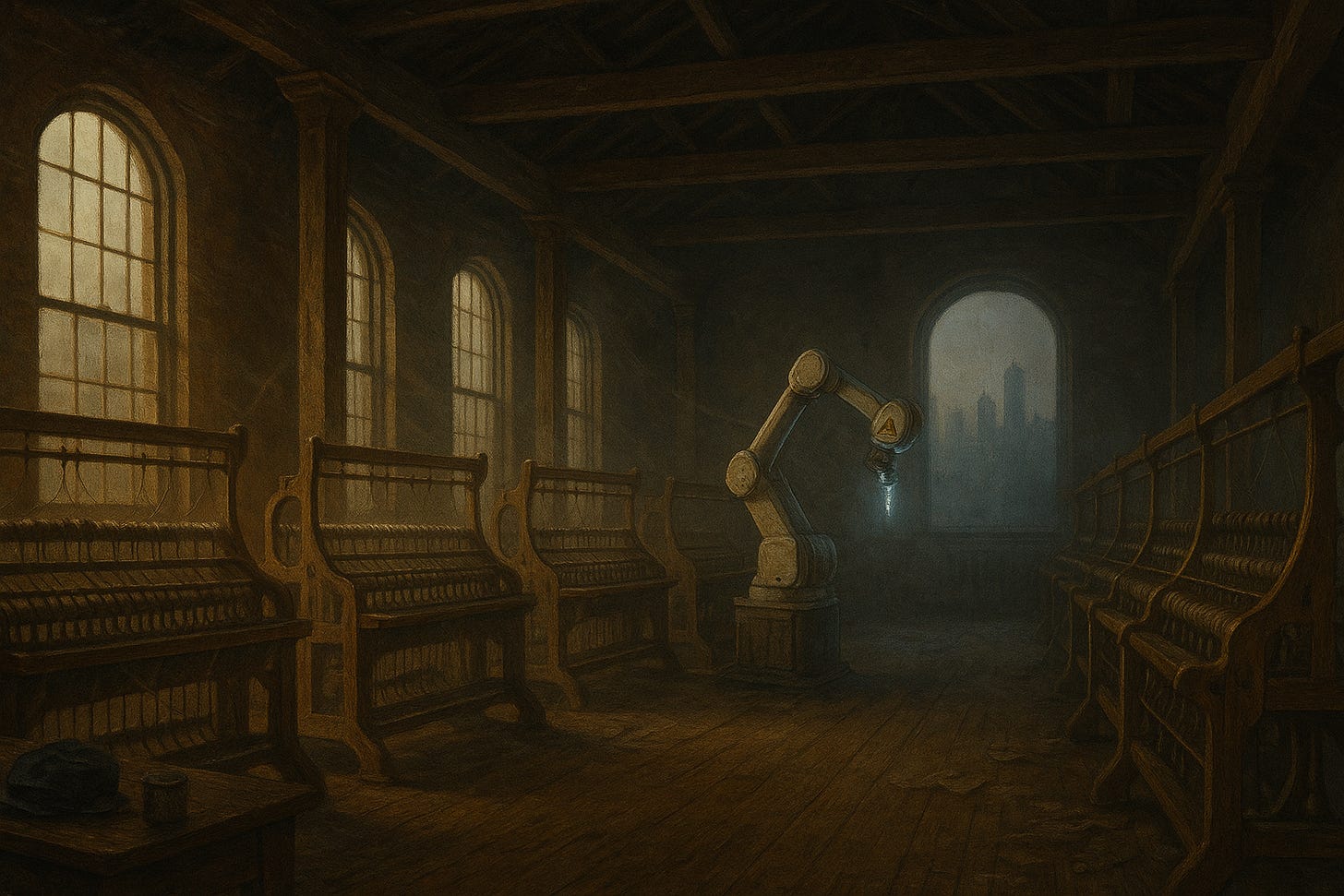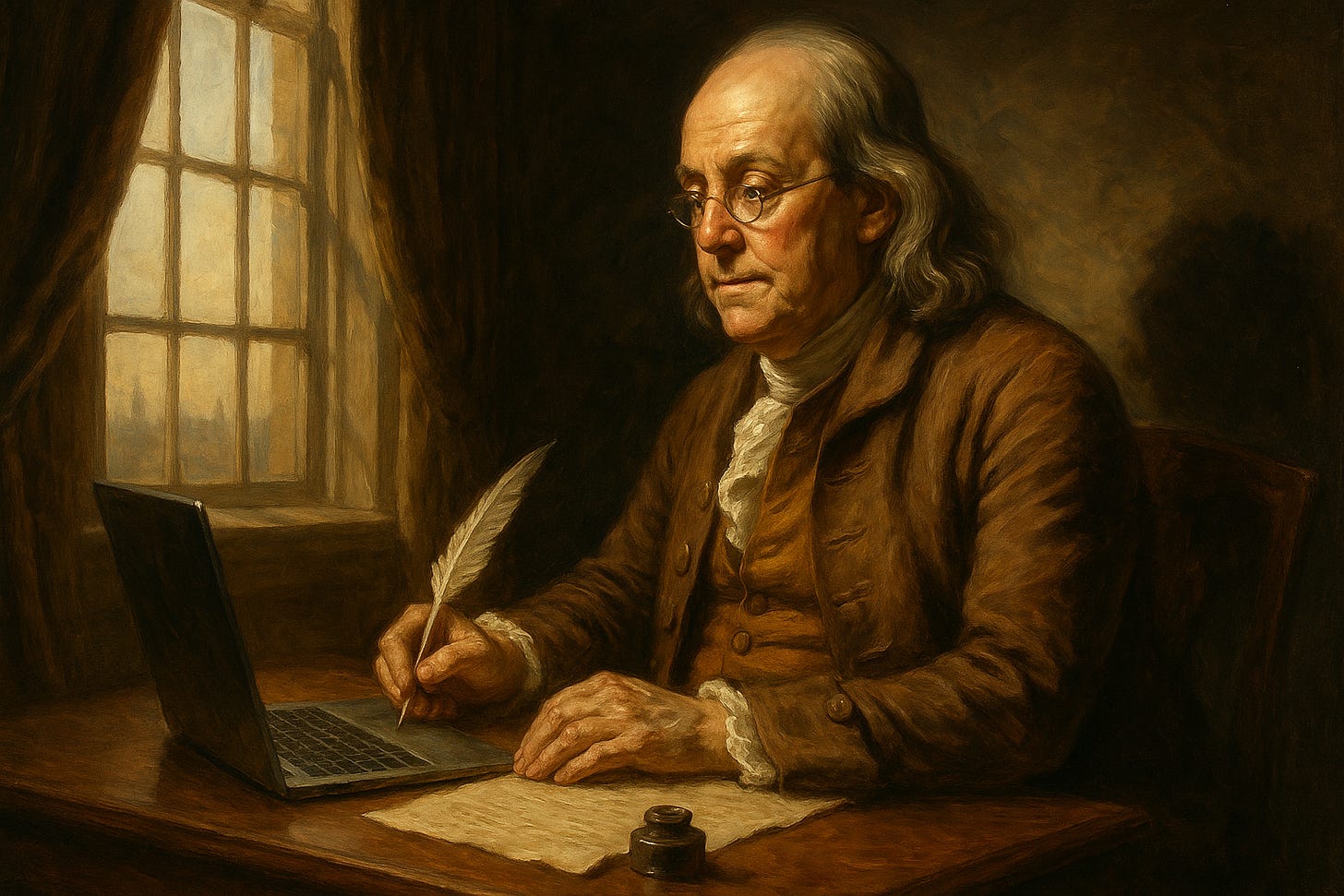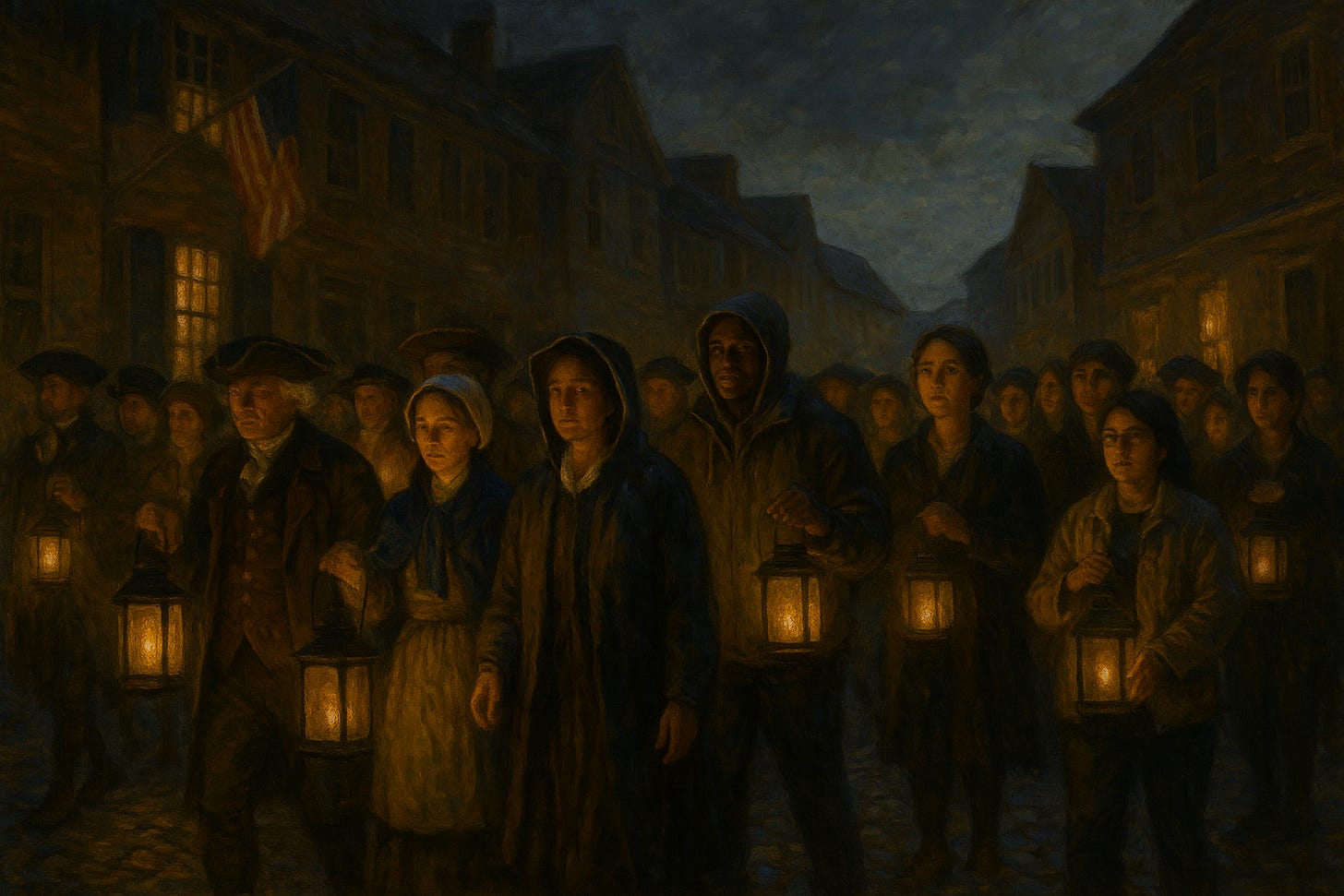Beating Fascism with a Musical
Why the film 1776 hits harder now than it ever did on the Fourth of July.
Every Fourth of July I watch 1776. It’s corny, theatrical, too long. But this year I couldn’t do it.
I couldn’t sit through two hours of men arguing about independence while ours was quietly disappearing.
For years it was a ritual — the overture swelling as Franklin and Adams trade barbs, the heat of Philadelphia making their powdered wigs sag. I used to find comfort in the idea that the country’s birth was messy and loud, that maybe the arguments themselves were the point. But lately it just feels like watching ghosts rehearse a script we stopped believing in.
I’m not sure why it came to mind — maybe because I’ve been thinking back to other times when America faced great uncertainty or because of this Saturday, when people will take to the streets for the No Kings protest.
And that’s when I read an essay by Christopher Armitage from “The Existentialist Republic.”
He had done the research I’d been afraid to do — studied every nation that slid into fascism to see if anyone had ever stopped it once it took power.
The answer was no.
Not once. Not ever.
Germany, Italy, Spain, Hungary — the list reads like a roll call of repetition. The pattern is perfect in its cruelty: conservatives panic about progress, ally with fascists to contain it, then get purged once the fascists win.
Democrats write editorials. Fascists consolidate power. Thirty to fifty years of darkness follows.
His conclusion was the part that finally broke me:
Once fascists win power democratically, they have never been removed democratically.
I’d known it in my bones. Armitage only gave it a name.
The window isn’t closing, he said — it’s closed.
And yet, he argued, this moment is different.
Not because we’re stronger, but because we’re stranger.
No fascist regime has ever ruled a nuclear superpower with the world’s reserve currency, satellite surveillance, and social media engineered to reinforce delusion.
No fascist state ever had an AI boom standing behind it — one poised to erase a third of its own labor force in a decade.
A Senate report released this October estimated that automation could eliminate up to 100 million U.S. jobs by 2035. That’s nearly a third of the entire economy.
Historically, it’s only taken a small fraction of workers walking off the job to grind a nation to a halt. But when those jobs vanish—replaced by code and circuitry—what leverage is left?
You can’t organize a general strike when no one has a job.
So power recalibrates. The government doesn’t need to outlaw protest when exhaustion does it for them.
And while we argue online about which billionaire said what, ICE vans idle quietly at the edges of blue cities.
The budgets are shifting, too. States are cutting social programs and funneling funds into “election security.” Translation: voter suppression with a badge.
The Supreme Court just lifted a restriction that had barred ICE from using race, language, or workplace as grounds for suspicion. The majority called it a question of “reasonableness,” not race — which means ethnicity can now count as one factor among others. In practice, that’s all the permission they need. Because “reasonable” is elastic: location becomes context, and context becomes cause.
Under the pretext of protecting elections from “illegal voting,” they’ll use that elasticity where it matters most — at the polls. Knowing full well that undocumented people can’t vote, they’ll still frame it as prevention. A few units stationed near polling sites in California, Arizona, or Texas are enough to keep thousands of legitimate Latino voters home. No need to falsify ballots; fear does the work. Suppress enough votes, seize enough state legislatures, and you can call for a Constitutional Convention. Two-thirds of the states are all it takes to rewrite the document completely.
The founders wrote checks and balances. The modern version is running balance sheets.
This is how fascism works now: not by marching on Rome but by freezing payrolls, hollowing pensions, and deputizing despair.
The point isn’t to convince you; it’s to exhaust you.
Every day the news reads like a systems log — institutions flickering offline one by one.
Congress traded oversight for immunity.
The courts sanctified corruption as precedent.
The press normalized collapse as coverage.
And the economy? It’s not collapsing so much as calcifying — automating the labor of millions while pretending it’s progress.
What do you call a country where the machines are thriving and the people are terrified?
We used to call it science fiction.
Now it’s a line item in a quarterly report.
I keep thinking about Armitage’s last section — the one where he tries to imagine the impossible: what resistance looks like after democracy.
He outlined four paths: coordinated blue-state coalitions ignoring federal edicts, silent mass non-compliance, secession, or international intervention.
Each of them reads like fiction. Each of them might also be the truth.
But before any of that, he writes one sentence that still sits in my chest:
The question isn’t whether these options are extreme. The question is whether we’re ready to admit that normal is already gone.
That’s the line that brought me back to 1776.
There’s a scene — you’ll know it if you’ve ever watched it — where Judge Wilson argues against independence. “There’s no legality here and certainly no precedent,” he says.
And Franklin, exasperated, shoots back that of course there isn’t —
“Because it’s a new idea.”
That’s it. That’s the whole American experiment in three words. A new idea.
The courage to invent a structure that didn’t exist yet.
If fascism is the oldest idea — the belief that fear and obedience can hold the world together — then our only answer is still the opposite: invention.
We are overdue to remember who we were when we built the thing in the first place.
Not the myth, not the anthem, but the audacity — the willingness to sign something no one else believed could work.
I don’t know if we can save this version of America.
Maybe Armitage is right and the window has already closed.
But the act of naming it still matters. Writing still matters.
Every fascism depends on forgetting; every rebirth begins with someone refusing to.
So maybe that’s why I’ll watch 1776 again next year.
Not because it will make me feel patriotic.
Because it will remind me what it looked like when ordinary, frightened people signed their names to an impossible future and called it freedom.
America invented the idea of democracy once.
If it falls, we can invent it again.
We just have to remember who we are.
“Never doubt that a small group of thoughtful, committed citizens can change the world; indeed, it’s the only thing that ever has.”
-Margaret Mead






A new idea for what will come after... but what will it look like, and who will be it's authors? Be safe in DC... I'm sure it will be peaceful, but they will probably try to stir things up.